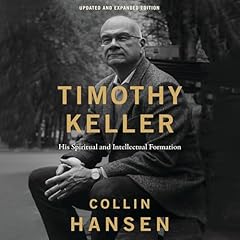
Making Sense of God
An Invitation to the Skeptical
No se pudo agregar al carrito
Solo puedes tener X títulos en el carrito para realizar el pago.
Add to Cart failed.
Por favor prueba de nuevo más tarde
Error al Agregar a Lista de Deseos.
Por favor prueba de nuevo más tarde
Error al eliminar de la lista de deseos.
Por favor prueba de nuevo más tarde
Error al añadir a tu biblioteca
Por favor intenta de nuevo
Error al seguir el podcast
Intenta nuevamente
Error al dejar de seguir el podcast
Intenta nuevamente
 Exclusivo para miembros Prime: ¿Nuevo en Audible? Obtén 2 audiolibros gratis con tu prueba.
Exclusivo para miembros Prime: ¿Nuevo en Audible? Obtén 2 audiolibros gratis con tu prueba.
Elige 1 audiolibro al mes de nuestra inigualable colección.
Acceso ilimitado a nuestro catálogo de más de 150,000 audiolibros y podcasts.
Accede a ofertas y descuentos exclusivos.
Premium Plus se renueva automáticamente por $14.95 al mes después de 30 días. Cancela en cualquier momento.
Compra ahora por $18.00
-
Narrado por:
-
Sean Pratt
-
De:
-
Timothy Keller
In this thoughtful and inspiring new book, pastor and New York Times bestselling author Timothy Keller invites skeptics to consider that Christianity is more relevant now than ever. As human beings, we cannot live without meaning, satisfaction, freedom, identity, justice, and hope. Christianity provides us with unsurpassed resources to meet these needs. Written for both the ardent believer and the skeptic, Making Sense of God shines a light on the profound value and importance of Christianity in our lives.
Los oyentes también disfrutaron:




















Reseñas de la Crítica
Praise for Timothy Keller and Making Sense of God
"Writing about philosophy and religion without jargon, condescension, or preaching, Keller produces an intelligent person’s invitation to faith." —Booklist
"Keller provides a calm and measured invitation to examine convictions and assumptions in a way that both believers and skeptics could use as part of a reasoned dialogue." —Library Journal
"Keller masterfully weaves in relevant history, politics, and literature while expounding on the scriptures, and effectively exposes the weaknesses of secularist and atheistic worldviews. . . . Skeptics with philosophical minds will appreciate Keller's thoughtful, tightly-argued prose." —The Christian Post
"Superb . . . we should be grateful to Keller for his wisdom, scholarship, and humility." —The Gospel Coalition
"Tim Keller’s ministry in New York City is leading a generation of seekers and skeptics toward belief in God. I thank God for him." —Billy Graham
"Unlike most suburban megachurches, much of Redeemer is remarkably traditional. What is not traditional is Dr. Keller’s skill in speaking the language of his urbane audience. . . . Observing Dr. Keller’s professorial pose on stage, it is easy to understand his appeal." —The New York Times
"Fifty years from now, if evangelical Christians are widely known for their love of cities, their commitment to mercy and justice, and their love of their neighbors, Tim Keller will be remembered as a pioneer of the new urban Christians." —Christianity Today
"Writing about philosophy and religion without jargon, condescension, or preaching, Keller produces an intelligent person’s invitation to faith." —Booklist
"Keller provides a calm and measured invitation to examine convictions and assumptions in a way that both believers and skeptics could use as part of a reasoned dialogue." —Library Journal
"Keller masterfully weaves in relevant history, politics, and literature while expounding on the scriptures, and effectively exposes the weaknesses of secularist and atheistic worldviews. . . . Skeptics with philosophical minds will appreciate Keller's thoughtful, tightly-argued prose." —The Christian Post
"Superb . . . we should be grateful to Keller for his wisdom, scholarship, and humility." —The Gospel Coalition
"Tim Keller’s ministry in New York City is leading a generation of seekers and skeptics toward belief in God. I thank God for him." —Billy Graham
"Unlike most suburban megachurches, much of Redeemer is remarkably traditional. What is not traditional is Dr. Keller’s skill in speaking the language of his urbane audience. . . . Observing Dr. Keller’s professorial pose on stage, it is easy to understand his appeal." —The New York Times
"Fifty years from now, if evangelical Christians are widely known for their love of cities, their commitment to mercy and justice, and their love of their neighbors, Tim Keller will be remembered as a pioneer of the new urban Christians." —Christianity Today
Las personas que vieron esto también vieron:


















Classic Keller
Se ha producido un error. Vuelve a intentarlo dentro de unos minutos.
Brilliant
Se ha producido un error. Vuelve a intentarlo dentro de unos minutos.
An intellectual challenge to the skeptic.
Se ha producido un error. Vuelve a intentarlo dentro de unos minutos.
Awesome book!
Se ha producido un error. Vuelve a intentarlo dentro de unos minutos.
Thought it was deeper.
I’m a big fan of this narrator too.
One of Keller’s Best
Se ha producido un error. Vuelve a intentarlo dentro de unos minutos.


